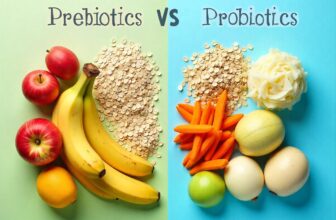
Are you tired of dealing with bloating, irregular digestion, and constant discomfort? For many women, gut health issues can significantly impact daily life, affecting everything from energy levels to emotional well-being. While a balanced diet is crucial, the right supplements can be game-changers in supporting optimal digestive health. 🌿
In recent years, research has shown that women’s gut health needs are uniquely different from men’s, particularly due to hormonal fluctuations and reproductive health factors. Yet, with countless supplements flooding the market, finding the right combination can feel overwhelming. The key lies in understanding which supplements specifically target women’s gut health needs and how to incorporate them effectively.
Join us as we dive into the world of gut health supplements for women, exploring everything from essential probiotics to natural sources of digestive support. We’ll guide you through understanding your gut health needs, identifying crucial supplements, and creating an effective supplementation strategy that works for your body. 💪
Understanding Women’s Gut Health
Common Digestive Issues in Women
Women experience unique digestive challenges, with IBS affecting twice as many females as males. Bloating, constipation, and acid reflux are particularly prevalent due to hormonal fluctuations throughout the menstrual cycle. These issues often intensify during pregnancy and menopause.
Hormonal Impact on Gut Function
Estrogen and progesterone significantly influence gut motility and microbiome balance. During menstruation, hormone shifts can trigger digestive discomfort and alter beneficial bacteria levels. These fluctuations can lead to increased inflammation and digestive sensitivity.
- Common Signs of Poor Gut Health:
- Irregular bowel movements
- Persistent bloating
- Frequent heartburn
- Unexplained fatigue
- Mood changes
| Hormone | Impact on Gut Health |
|---|---|
| Estrogen | Affects microbiome diversity |
| Progesterone | Influences gut motility |
| Cortisol | Impacts digestive inflammation |
Essential Gut Health Supplements
Probiotics like Lactobacillus and Bifidobacterium strains form the cornerstone of women’s gut health, supporting digestive balance and immune function. These beneficial bacteria, combined with prebiotics such as inulin and FOS (fructooligosaccharides), create a robust digestive ecosystem. Digestive enzymes aid in breaking down proteins, fats, and carbohydrates efficiently.
Omega-3 fatty acids, particularly EPA and DHA, reduce gut inflammation and support overall digestive health. Here’s a quick reference guide for essential supplements:
| Supplement Type | Key Benefits |
|---|---|
| Probiotics | Digestive balance, immunity |
| Prebiotics | Feed good bacteria |
| Digestive Enzymes | Nutrient absorption |
| Omega-3s | Reduce inflammation |
Natural Supplement Sources
Fermented Foods
Probiotic-rich fermented foods like kimchi, sauerkraut, and kombucha are excellent natural sources for women’s gut health. These foods contain beneficial bacteria that support digestive wellness and immune function. Yogurt and kefir are particularly beneficial as they provide both probiotics and calcium, essential for women’s health.
Fiber-rich Options & Herbal Supplements
- Fiber-rich sources:
- Chia seeds
- Flaxseeds
- Psyllium husk
- Leafy greens
| Herbal Supplement | Benefits |
|---|---|
| Ginger | Reduces inflammation |
| Peppermint | Aids digestion |
| Turmeric | Anti-inflammatory |
| Slippery Elm | Soothes gut lining |
Choosing the Right Supplements
Quality Indicators and Dosage
Select supplements with third-party testing and GMP certification to ensure safety and potency. Look for products free from artificial additives and allergens. Daily probiotic doses should contain 1-10 billion CFUs, while prebiotics typically range from 3-5 grams per serving.
Timing and Interactions
Take probiotics on an empty stomach, ideally 30 minutes before meals. Prebiotics can be consumed with food. Be cautious when combining supplements with antibiotics – space them at least 2 hours apart. Always consult healthcare providers, especially if taking medications.
- Key Quality Markers:
- Third-party testing
- GMP certification
- Clean ingredient list
- Proper storage instructions
| Supplement Type | Best Time to Take | Recommended Dosage |
|---|---|---|
| Probiotics | Morning, empty stomach | 1-10B CFUs |
| Prebiotics | With meals | 3-5g |
| Digestive Enzymes | With meals | As directed |
Maximizing Supplement Benefits
Combining lifestyle factors with proper supplementation is crucial for optimal gut health. Regular exercise stimulates digestive function, while stress management through meditation or yoga helps reduce inflammation. Adequate sleep (7-9 hours) supports gut barrier repair and enhances supplement absorption.
| Supplement Type | Best Time to Take | Storage Method |
|---|---|---|
| Probiotics | Morning, empty stomach | Refrigerated |
| Digestive Enzymes | With meals | Room temperature |
| Prebiotics | With or without food | Cool, dry place |
Now that you understand how to maximize your supplement benefits, let’s explore how to maintain consistency in your gut health routine.
Supporting your gut health through targeted supplementation can be a game-changing step in your wellness journey. From probiotics that restore beneficial bacteria to digestive enzymes that enhance nutrient absorption, the right supplements can help address common digestive issues while boosting your overall health and immunity.
Remember to choose high-quality supplements from reputable manufacturers and consult with your healthcare provider before starting any new supplement regimen. By combining carefully selected supplements with a balanced diet and healthy lifestyle habits, you can build a strong foundation for optimal gut health and whole-body wellness.






